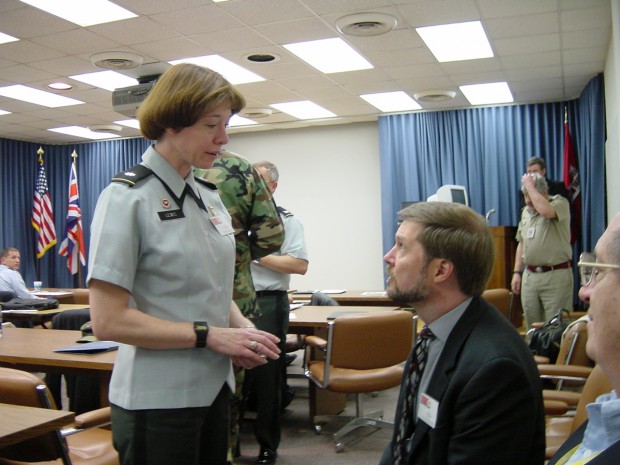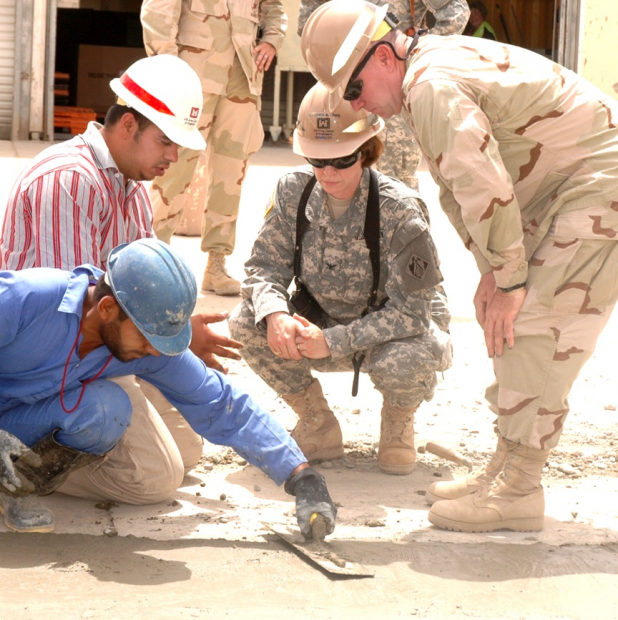EDITOR’S NOTE: The Class of 2016 graduated from the United States Military Academy this past weekend; of 953 graduates, 151 are women. That number is up from the 62 who graduated with the first class of women in 1980. Members of that first class of women gathered last month, to mark their 40-year milestone of being admitted to West Point in 1976. They shared lessons learned at the “Athena’s Arena” leadership conference, and invited freelance war reporter Alex Quade along. This is Quade’s profile of one of these trailblazing women, and her message on embracing adversity, facing stress and coming out stronger.
WEST POINT, N.Y. — Adversity is nothing new for combat veteran Colonel Debra M. Lewis, a pioneering woman in the Army. The mother of one, and stepmother of two, retired after thirty years of active duty in 2010. During her career Lewis was an inspector general, a commander in Iraq, inside the Pentagon during the 9/11 attack, and graduated with the first class of women at West Point in 1980.
“Women have come a long way and we have every reason to be proud. When we arrived to West Point we faced low-to-no expectations on our ability to do anything,” Lewis said.
She and her sisters-in-arms faced open hostility and challenges as the first females at the Academy. “But look at us now: we have women who’ve graduated Ranger School, women in top-level positions, and we’ve proved we can deal with adversity,” she stated.
Adversity is what drives Lewis to now help others be their best when stressed; especially other women, and veterans with post-traumatic stress (PTS). Though never officially diagnosed with PTS, Lewis has experienced symptoms.
“My medical assessment when I left the military said my experiences could’ve badly affected me, but that I appeared stronger because of them. That doesn’t mean I won’t get rattled by events in the future, but normally I’m excited to take on new challenges and face adversity that others run from,” Lewis said.
Lewis is sharing her story for the first time, because she wants other women and veterans to glean tips from what she’s discovered about handling her own stress.
“Women and veterans want to be valued, heard and supported. Those who get it, share in the magic that’s possible when we work together,” Lewis said. “I’ve worked hard to take everything I’ve faced and transform it to an opportunity to be my best and get better.”
Lewis confronted her own unhealthy stress three years ago.
“I call it ‘toxic garbage.’ I’d had negative, painful memories of toxic people and situations I’d dealt with over the years, in my head, which were holding me back, starting with being at the Pentagon on 9/11,” she said.
“TOXIC GARBAGE HOLDING ME BACK”
On September 11, 2001, Lewis was an engineer in Antiterrorism and Force Protection at the Pentagon, reporting to the Joint Staff.
“My job? Keep people safe in buildings from terrorist attacks,” Lewis said. Within her office, they’d been tracking all terrorist activity, including the attack on the destroyer USS Cole, and terrorists like Osama bin Laden before 9/11.
When their office walls shook violently that morning, Lewis and her colleagues thought it was heavy equipment dropping on the floor being renovated above them.
“But then we realized this was tied to the attacks, and wondered if we were being bombed,” she recalled. Fire alarms sounded. They evacuated. Lewis witnessed friends and colleagues with bloodied shirts, carrying documents past her. Cell service was disrupted; they couldn’t call their families.
“We received reports of other planes heading our direction,” Lewis said. “One key role of engineers like me is to save lives. Yet few aside from the military and emergency responders have a clue about the effort and vigilance needed to reduce our risks.”
Lewis did not allow the personal impact of that day to hit her for as long as she could; she kept her guard up against her emotions. After a month, she finally let her guard down and cried for the first time.
“Right after 9/11, our office went to work 24/7 with a laser focus to defend the nation and go after the terrorists responsible. I didn’t have a moment,” Lewis said.
But weeks later, at the Army-Navy football game, Lewis felt panicky when a loud noise rocked the crowded stadium. She didn’t know what was happening. It turned out to be the sonic boom from fighter jets flying over the stadium.
“The entire stadium shook; like how it felt when the Pentagon shook when the plane hit on 9/11,” Lewis said.
Lewis was experiencing PTS-like symptoms, though never officially diagnosed. She says subsequent events during her military career compounded her symptoms. Teams she sent to Iraq during the early part of the war were ambushed.
In 2006 and 2007, as the U.S. Army Corps of Engineers Commander for the Central District in Iraq, she faced death. On different occasions, her convoys were shot at, mortars landed around her official meetings and visits, and her people were injured.
“During the heaviest fighting, we lost security personnel working for me, military who supported our reconstruction mission, and Iraqis who worked for me,” Lewis said. She went to the morgue with Iraqi employees to identify family members killed.
By then, she was an expert at compartmentalizing. Lewis focused on the mission, amidst attacks, injuries and killings around her. She separated the risk, leaving it to her security detail to worry about. She was on “auto-pilot,” just as she’d been at the Pentagon in the month after the 9/11 attack. Lewis described it as a sense of calm, even while facing continuous stress over their mission and the horrors of war.
“I didn’t have the luxury of getting emotional,” Lewis said. “My hardest task was not being home to hold my daughter, who cried on the phone.”
Later, as inspector general for the Washington State National Guard, she dealt with the adverse effects of multiple deployments and years of war were having on troops, families and caregivers.
“It wasn’t until after I retired and transitioned back to the civilian world — wanting to help others from my experiences — that pushed me to my limits a few times. I operate at an extremely high level, but we all have limits,” Lewis admitted.
With news of Osama bin Laden’s death, Lewis felt more sadness. “I remembered friends who’d been injured and died,” she said.
Lewis admitted she felt all of these “toxic garbage” memories were holding her back — despite the fact that she was a West Point graduate, had grown up an Army brat, and had been a trailblazing woman in the Army.
“Then I had a watershed moment, which put me on a path to reach higher,” Lewis said.
WATERSHED MOMENT: THE IMPORTANCE OF STORYTELLING
Her “ah-ha” moment came at a private event in 2013, after hearing the stories of the hunt for Osama bin Laden directly from Special Operators who’d participated in that 10-year mission from its alpha to its omega.
Lewis first listened to retired Green Beret Joe Jung discuss the secret “Horse Soldiers” mission in Afghanistan right after 9/11 – where Special Forces teams advising the Northern Alliance, overthrew the Taliban. Then she heard former SEAL Team-6 member Robert O’Neill, who was on the mission resulting in the death of bin Laden.
Hearing the full-circle details of that mission, which began with the attacks on 9/11, was pivotal for Lewis. Memories flashed before her. She described it as an intense wave of emotion, and “a jumble of feelings,” which she said, had been holding her back.
“Listening to both stories – I didn’t know that combination would help me put these events together in such a way that I suddenly felt a profound sense of closure,” Lewis said.
Which is why Lewis changed course from retirement in Hilo, Hawaii — to become a speaker, author and entrepreneur — after hearing the stories of those two Special Operators.
“It was a huge reminder of how important it is to tell our stories,” Lewis said, and why she’s now telling hers. She wants veterans to know that there are plenty of people who deal with extreme adversity and come out stronger.
“I believe PTS is not always what people think, nor is it necessarily a life sentence,” she added. Lewis was recently diagnosed with Adrenal Fatigue, which can mimic PTS-like symptoms.
“I’d been running on adrenalin and not producing healthy hormones. Significant, unhealthy stress can trigger it. It may not be PTS, but it absolutely effects our health, when dealing with negativity. I figured out that I had to transform negative situations into something positive fast,” Lewis said. She encourages others who have faced extreme stress and who are having difficulty coping, to also look into Adrenal Fatigue, with their doctor.
What works for Lewis is seeking challenges outside her comfort zone; something she’s done since West Point.
She also encourages women and veterans to try to re-frame their negative experiences, by trying to think about what happened in the past, in more productive ways.
Lewis now speaks on what she’s learned about better handling unhealthy stress and adversity, and lessons she wished someone had told her before entering West Point forty years ago.
HERE ARE SOME OF COL. DEBRA LEWIS’ TAKE-AWAYS & TIPS:
— “Greater adversity leads to bigger impacts.” Lewis advises pushing your limits early and often, physically, mentally and emotionally. She says being uncomfortable is good for you.
— “Appreciate your toughest moments. They reveal powerful life lessons when you’re open to receive them.”
— “When slammed, attacked, or put down by others — it’s never about you,” Lewis says to find your best self and hold tight.
— “Stuff happens. Expect it. It’s what you do next that counts,” Lewis says high standards honor and ignite the talents of all.
— “Challenges that have everyone’s attention make meaningful and lasting change possible,” Lewis advises jumping in and embracing those challenges.
— “Achievements we celebrate today were built upon past sacrifices and failed attempts,”Lewis reminds that every failure leads to progress.
— “Live boldly, take risks, and when knocked down — get excited about how fast you get back up, ready to face life,” Lewis says.
(Freelance war reporter Alex Quade covers U.S. Special Operations Forces on combat missions downrange. Her first book, “Danger Close,” will be published by Hachette. For more information: www.alexquade.com)





